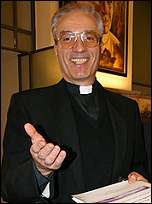The Italian newspaper La Stampa reports that a high-standing Italian bishop Raffaello Martinelli is ‘open’ to the use of meditation and yoga by Catholics in their prayer life.
Bishop Martinelli on the usefulness of meditation
Martinelli says that meditation practices “can be suitable means for the faithful to stand before God.”

The bishop explains that “[…] since the Catholic Church rejects nothing that is true and holy in these religions [Nostra Aetate, 2], a Catholic should not be prejudiced against controlled breathing, mantras and other Eastern practices as being non-Christian.
“The Catholic can, however, take from them what is useful, provided he does not lose sight of the Christian conception of prayer, its logic and its needs since it is within the Christian spiritual sphere these practices must be employed.”
This could herald a notable shift in the position of Vatican on the whole issue. Bishop Martinelli is by no means an insignificant figure in the Catholic community, having served as an aide to Pope Benedict XVI when the pope was the head of the Congregation of the Doctrine of the Faith, the Vatican’s watchdog of doctrinal orthodoxy. He is regarded as a doctrinal expert whose word counts a lot in the Church.
More traditional perspectives still strong among the Christian community
However, there are still many Christians who regard all kinds of ‘Eastern meditations’ suspiciously. For example, Rev. Ian VanHeusen, writing on catholic.org, says:
“Before you think that this article is another stereotypical condemnation of Transcendental Meditation and other forms of East Asian meditation practices, I ask you to think again. Christians are not able to practice Transcendental Meditation not because it is immoral or because it opens you to the demonic, but rather due to the nature of what it means to be a Christian. Due to Baptism, Christians are brought into a relationship with the triune God, and this relationship is opened up through the gift of God’s grace.”
Although the teachers of Transcendental Meditation have always stressed that, at least in the case of the specific meditation technique of TM, it is not a religion, a lifestyle, or a philosophy, many in the Church still tend to be wary of these statements. As Rev VanHeusen continues in his article:
“We should also recognize the possibility that a baptized Christian is engaging in Transcendental Meditation as an explicit rejection of Christ. In that case, they are denying their identity in Christ, and such a practice would be the essence of personal sin, namely the rejection of God’s love made possible in Jesus Christ. In certain sense, such a person would be working against the activity of the Holy Spirit, and this can be a gateway to more serious conditions such as demonic possession.”
READ MORE:
Catholic priest Father Mejia offers Transcendental Meditation courses to street children
















